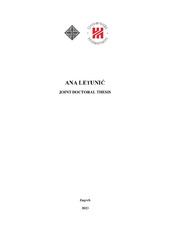Uticaj finansijskih instrumenata evropskih kulturnih politika na strategije kustoskih praksi u savremenim izvođačkim umetnostima
Metadata
Show full item recordAuthor:
Letunić, AnaFaculty:
Факултет драмских уметностиDate Issued:
21-08-2023Advisor:
- Šešić Dragićević, dr Milena
- Schneider, dr Wolfgang
Committee members:
- Cvetičanin, dr Predrag
- Karaulić, dr Jovana
- Heinecke, dr Julius
Abstract
This research stems from the idea that the current cultural policy discourse of the European Union points to the necessity of the struggle for articulation of values in art that are above those pragmatically instrumental, using the examples from the German and post- Yugoslav independent performing arts scenes as case studies. The priorities of the European Union programmes Culture 2007-2013 and Creative Europe 2014-2020 are coming from the current socioeconomic policies so the arts and culture is increasingly associated with social action, the promotion of individual and collective identities and the support to urban regeneration projects, which altogether creates a debate on possible instrumentalization of culture. At the same time, the European independent performing arts scene reflects these social complexities and the changes in European society more incisively, due to its networks reaching far beyond the national performing arts cultures and the precarious nature of its work condi...tions. Inevitably, what arises is the question of reverse impact studies that are the subject of this research while its objective is the examination of the influence of financial instruments of cultural policy on the formation of organisational cultures, curatorial strategies and aesthetics development in the European independent performing arts scene. Practices from the post- Yugoslav and German independent performing arts scene that will be analysed in this research suggest that the discussion on the new evaluation criteria and valorisation of artistic production belongs to the domain of bottom-up cultural policies and the struggle for the public interest on a European level. The qualitative analysis presented in this study aims to provide a foundation for an original perspective on the role of independent performing arts within society. Specifically, it aims to explore the relationships between cultural policy and the value of the arts, as well as the involvement of independent culture and arts organisations in the development of valorization for their work.
Ova teza proizlazi iz ideje da trenutni kulturnopolitički diskurs Europske unije ukazuje na nužnost borbe za artikulaciju vrijednosti u umjetnosti iznad onih pragmatično instrumentalnih, koristeći primjere s njemačke i postjugoslavenske scene nezavisnih scena izvedbenih umjetnosti kao studije slučaja. Prioriteti programa Europske unije Kultura 2007.-2013. i Kreativna Europa 2014.-2020. proizlaze iz aktualnih socioekonomskih politika pa se umjetnost i kultura sve više povezuju s društvenim djelovanjem, promicanjem individualnih i kolektivnih identiteta te potporom projektima urbane regeneracije, što sve zajedno otvara raspravu o mogućoj instrumentalizaciji kulture. Istodobno, europska scena nezavisnih izvedbenih umjetnosti oštrije odražava ove društvene složenosti i promjene u europskom društvu, zahvaljujući svojim mrežama koje sežu daleko iznad nacionalnih kultura izvedbenih umjetnosti te prekarnim uvjetima rada. Neizbježno se nameće pitanje obrnutih studija utjecaja koje su pred...met ovog istraživanja, a cilj mu je ispitivanje utjecaja financijskih instrumenata kulturne politike na formiranje organizacijskih kultura, kustoskih strategija i razvoj estetike u europskoj nezavisnoj izvedbenoj umjetničkoj sceni. Prakse s postjugoslavenske i njemačke nezavisne izvedbene umjetničke scene koje će biti analizirane u ovom istraživanju sugeriraju da rasprava o novim kriterijima vrednovanja umjetničke produkcije spada u domenu kulturnih politika odozdo prema gore i borbe za javni interes na europskoj razini. Kvalitativna analiza predstavljena u ovoj studiji ima za cilj pružiti temelj za originalnu perspektivu o ulozi nezavisnih izvedbenih umjetnosti u društvu. Konkretno, cilj joj je istražiti odnose između kulturne politike i vrijednosti umjetnosti, kao i uključenost nezavisnih kulturnih i umjetničkih organizacija u razvoj valorizacije vlastitog rada.

